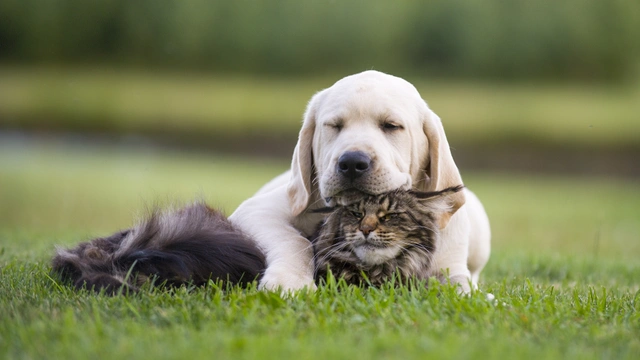
7 of the most frequently asked health questions
Would you know what to do if your pet was ill? Jessica May, Lead Vet for FirstVet, the 24-hour digital veterinary service, is here to help. Read on to find answers to 7 of the most commonly asked questions from cat and dog owners.
1. Is it normal for puppies to have diarrhoea?
Young puppies can get diarrhoea for several reasons, including a change in diet or because they’ve eaten something harmful. If your puppy has diarrhoea once, but is otherwise well, you can offer them food and water as normal and monitor them closely.
However, if your puppy is lethargic, has severe stomach pain, shows signs of dehydration, has not eaten food or drunk any water for 4-6 hours, has blood in the stools, or very dark stools, this could be a sign of something more serious; and they will need to be taken to a vet.
2. Why is my cat limping?
Cats are good at hiding pain so, if your cat is limping, you should take this as a sign that something is wrong. Begin by gently and carefully checking your cat all over for swellings, soreness and wounds, particularly the legs and around the head and tail. You can book a video call with a vet at FirstVet who can guide you through this initial assessment.
If your cat has been involved in an accident, cannot walk, or has a deep wound or abscess or a wound close to a joint, they should be taken to a vet immediately. Other causes of lameness in cats include soft tissue injuries; for example a strained or bruised muscle or tendon, or a damaged claw. Treatment will depend on the cause.
3. Why does my dog scratch himself constantly?
Just like humans, dogs can develop allergies. Signs include licking paws excessively, mild to excessive scratching of their skin, inflamed and itchy ears, hair loss and secondary skin infections. Allergies can be food related or triggered by the environment; for example an allergy to dust mites or pollen. The first step will be to rule out other causes of itching, such as fleas or ringworm.
If diet is identified as the cause, a process of food elimination is likely to be recommended to identify the trigger. If the allergy is triggered by the environment, medication may be required; along with the use of specially formulated shampoos designed to soothe dogs’ skin.
4. My cat keeps scratching her ears, and is making them sore.
Excessive scratching and head shaking, smelly ears and waxy discharge can all be signs of an ear infection. There are many reasons why cats develop ear problems and infections, which can be very painful and unpleasant. They include excess wax, ear mites or a trauma caused by your cat getting into a fight.
Treatment will depend on what’s causing the problem. You can get advice from a FirstVet vet about whether your cat needs to be taken to a vet. They will also be able to explain how to carry out a weekly examination of your cat, which includes checking their ears, to prevent future problems.
5. My dog has eaten some chocolate - what should I do?
Chocolate contains a chemical called theobromine, which is toxic to dogs; even in small quantities. If you suspect your dog has eaten chocolate, it’s important to get advice from a vet as soon as possible. They will need to know the percentage of cocoa solids in the chocolate, how much your dog has eaten and how much they weigh. Darker chocolate contains more cocoa solids, which makes it more toxic.
A FirstVet vet can advise you via a video call, and help to determine the level of risk and whether your pet needs to be taken to a vet. If you suspect your animal has eaten chocolate and your waiting time with FirstVet is more than 15 minutes, you can still book a video call but you should also try to contact your nearest veterinary practice. This is to make sure that your dog receives veterinary treatment quickly.
6. My cat is straining to pee.
If you notice a change in your cat’s peeing behaviour, it’s important to seek veterinary advice. This may be a sign of a urinary tract infection, which is also known as cystitis. Symptoms include difficulty going to the toilet, peeing in unusual places, peeing more often, blood in urine, and licking their genitals excessively.
Urinary tract infections are more common in middle-aged cats that don’t get much exercise, use an indoor litter tray and are fed dry food. Stress caused by changes in their routine, or a new cat in the house, can also trigger bouts of cystitis.
Treatment will depend on the cause of the infection and can include medication, a change in diet to a specialist food and taking action to reduce the cat’s stress levels.
7. How can I tell if my dog has kennel cough?
Kennel Cough is a common respiratory condition in dogs, which is highly contagious and spreads via airborne droplets. It can be picked up anywhere - not just in kennels. Vaccination is the best way to reduce the severity of kennel cough.
The main symptom is a hacking cough; other symptoms can include nasal discharge, a high temperature, lethargy and reduced appetite. Treatment will depend on the symptoms; most dogs simply need rest and TLC but puppies and older dogs may require antibiotics or anti-inflammatories.
If your dog has a cough, a FirstVet vet can assess your pet via a video call. The vet can provide professional advice about if and how you can treat your pet at home and when to take your pet to a vet.



